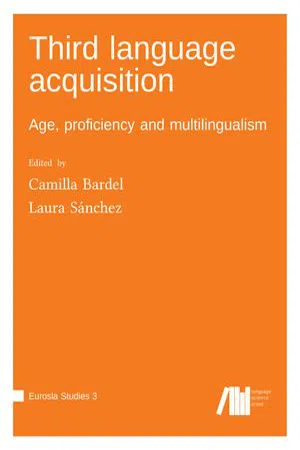
Third language acquisition : Age, proficiency and multilingualism
- English
- PDF
- Available on iOS & Android
Third language acquisition : Age, proficiency and multilingualism
About this book
This book deals with the phenomenon of third language (L3) acquisition. As a research field, L3 acquisition is established as a branch of multilingualism that is concerned with how multilinguals learn additional languages and the role that their multilingual background plays in the process of language learning. The volume points out some current directions in this particular research area with a number of studies that reveal the complexity of multilingual language learning and its typical variation and dynamics.The eight studies gathered in the book represent a wide range of theoretical positions and offer empirical evidence from learners belonging to different age groups, and with varying levels of proficiency in the target language, as well as in other non-native languages belonging to the learner's repertoire. Diverse linguistic phenomena and language combinations are viewed from a perspective where all previously acquired languages have a potential role to play in the process of learning a new language.In the six empirical studies, contexts of language learning in school or at university level constitute the main outlet for data collection. These studies involve several language backgrounds and language combinations and focus on various linguistic features. The specific target languages in the empirical studies are English, French and Italian.The volume also includes two theoretical chapters. The first one conceptualizes and describes the different types of multilingual language learning investigated in the volume: i) third or additional language learning by learners who are bilinguals from an early age, and ii) third or additional language learning by people who have previous experience of one or more non-native languages learned after the critical period. In particular, issues related to the roles played by age and proficiency in multilingual acquisition are discussed. The other theoretical chapter conceptualizes the grammatical category of aspect, reviewing previous studies on second and third language acquisition of aspect. Different models for L3 learning and their relevance and implications for representations of aspect and for potential differences in the processing of second and third language acquisition are also examined in this chapter.As a whole, the book presents current research into third or additional language learning by young learners or adults, considering some of the most important factors for the complex process of multilingual language learning: the age of onset of the additional language and that of previously acquired languages, social and affective factors, instruction, language proficiency and literacy, the typology of the background languages and the role they play in shaping syntax, lexicon, and other components of a L3.The idea for this book emanates from the symposium Multilingualism, language proficiency and age, organized by Camilla Bardel and Laura Sánchez at Stockholm University, Department of Language Education, in December 2016.
Frequently asked questions
- Essential is ideal for learners and professionals who enjoy exploring a wide range of subjects. Access the Essential Library with 800,000+ trusted titles and best-sellers across business, personal growth, and the humanities. Includes unlimited reading time and Standard Read Aloud voice.
- Complete: Perfect for advanced learners and researchers needing full, unrestricted access. Unlock 1.4M+ books across hundreds of subjects, including academic and specialized titles. The Complete Plan also includes advanced features like Premium Read Aloud and Research Assistant.
Please note we cannot support devices running on iOS 13 and Android 7 or earlier. Learn more about using the app.
Information
Table of contents
- Contents
- 1 Introduction Camilla Bardel & Laura Sánchez
- 2 Multilingualism from a language acquisition perspective Laura Sánchez
- 3 The conceptualisation of knowledge about aspect: From monolingual to multilingual representations Rafael Salaberry
- 4 The mental lexicon of multilingual adult learners of Italian L3: A study of word association behavior and cross-lingual semantic priming Anna Gudmundson
- 5 The acquisition of clitic pronouns in complex infinitival clauses by German-speaking learners of Italian as an L3: The role of proficiency in target and background language(s) Sandro Sciutti
- 6 Cognate recognition by young multilingual language learners: The role of age and exposure Carmen Muñoz
- 7 Age meets multilingualism: Influence of starting age on L3 acquisition across different learner populations Simone E. Pfenninger
- 8 From L2 to L3, verbs getting into place: A study on interlanguage transfer and L2 syntactic proficiency Laura Sánchez
- 9 L1 Dutch vs L2 English and the initial stages of L3 French acquisition Rosalinde Stadt, Aafke Hulk & Petra Sleeman
- Index